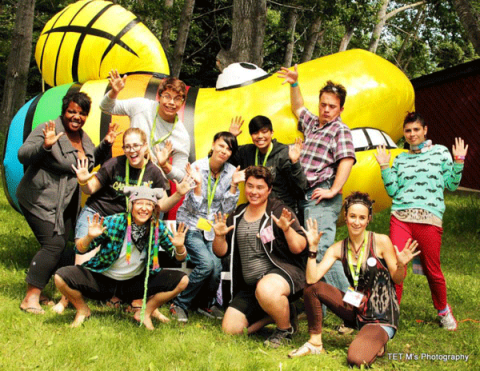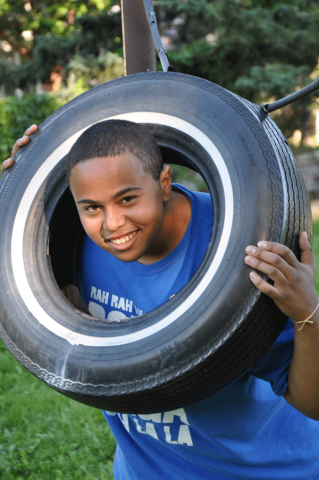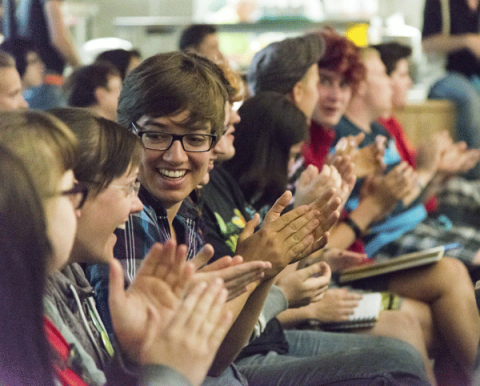
If that sounds like a heavy agenda for a bunch of kids in the middle of glorious summer, it is. But those attending Camp fYrefly –— an acronym for ‘fostering, Youth, resiliency, energy, fun, leadership, yeah!’ — have typically dealt with much tougher issues like bullying, harassment and identity crisis.
The opportunity to be in a safe, supportive environment among others waging similar battles is a paradise of a sort, and one most campers wouldn’t swap for the world even if the fYrefly program can be demanding.
Founded in 2004 by Dr. André P. Grace and Dr. Kristopher Wells — both esteemed educators at the University of Alberta — Camp fYrefly is Canada's only “national leadership retreat” (to use their words) for “lesbian, gay, bisexual, trans-identified, two-spirited, intersexed, queer, questioning, and allied youth.” Camps are held annually in Edmonton, Calgary and Regina; national expansion plans are in the works.
Over four days through a series of workshops led by former campers, volunteers and other qualified personnel, fYrefly campers learn, among other things, how to spot homophobia hiding in plain sight (“Media Awareness: Heteronormativity in Advertising”), how to be community advocates ("What is a Hate Crime?"), how to stay grounded ("Cool Minds: Coping with Stress") and why the arts can save the soul ("Music for Social Change").
“I wish I’d heard about Camp fYrefly earlier because it might have made a huge difference in my life,” 23-year-old Marissa Taylor tells Samaritanmag.
Taylor, who is transgendered, attended camp in Calgary for the first time in 2013 on the advice of her psychologist. “I had gone through a very deep depression prior to going — I was suicidal,” she says. Since then, Taylor has addressed other students in schools about her experiences as part of the fYrefly in Schools outreach program.
She continues: “All the campers I met had similar experiences. Every kid there felt like they didn’t belong. We all had been bullied and had sad stories. I was bullied by my teachers who just didn’t accept me. My parents, who were very supportive, had to fight just so I could go to school dressed as my chosen sex. But I made many lasting friendships at the camp and a lot of us are going back this year, myself included.”
Interestingly, given its connection to the University of Alberta, fYrefly wasn’t some highbrow academic venture, according to co-founder Wells. Rather, it was the brainchild of those the camp targets.
“I was working with a youth group that met every Saturday night from 7 to 9 p.m. They said to me, ‘We want more than two hours every week where we can be safe and be ourselves.’ The Camp stemmed from there,” Wells tells Samaritanmag, noting that the kids also thought up the name.

Today, a typical camp has about 40 campers and 15 support staff and volunteers.
“From the start I wasn’t interested in creating a recreational camp,” Wells says. “I was interested in creating a leadership camp and building that next generation of leaders in their schools, families and communities.”
As Wells explains, organizers looked to various social justice movements (U.S. civil rights, the feminist community, early gay activism) for ideas about programming and best practices. As a result, “Those four days at camp are intensive; there are a lot of community members investing in these youth,” he says.
“You have to be a leader to yourself before you can be a leader to others. That means addressing homophobia and transphobia and accessing useful information not available in the school environments so youth can make informed and healthy decisions about their lives. That reduces risk and supports resilience.”
As with Marissa Taylor, many find out about Camp fYrefly through health professionals including public health nurses, through community groups, the Internet and, especially, word of mouth. “Also from their parents,” Wells says.
“Sometimes kids don’t want to come to camp but the parents send them and it was the best thing they ever did. Camp provides socialization parents can’t.” The Alberta Teachers Association also distributes Camp fYrefly postcards to junior and senior high schools across in the province.
And there is a Camp fYrefly roadshow taking the message into schools.
“We’ve done a good job reaching and supporting LGBT youth but we needed to reach mainstream heterosexual kids holding homophobic attitudes and using hurtful language like ‘dyke’ and ‘fag.’ So fYrefly in Schools takes young people into schools to deliver peer-to-peer workshops addressing homophobia,” Wells says.
“In 2013 — in conjunction with our camps in Edmonton and Calgary — we were in over 155 classrooms and reached over 4,000 students. So we are expanding the reach of the camp and the programming and providing it for free. For some students, this is the only time they hear about these issues and they are going to remember it coming from someone their own age.”
Taylor — who says she knew she was transgendered at age four and underwent sex re-assignment surgery at 18 — says “fYrefly in Schools would have made a huge difference if it had happened when I was in school.
“I myself am now a panelist and we’ve had a wonderful response. We talk about the history of gay rights, resiliency, what the Camp is all about. I’ve had kids come up to me and start crying because I talk about exactly how they feel.”
And while camp is free for youth to attend, campers are asked to put up a $25 “commitment fee” as a show of good faith (though that’s waived if kids can’t afford it). Funding comes from a mix of “private donations and some government and corporate support, plus the faith community.
“Drag kings and queens stage fundraisers,” Wells says, “and sometimes workplaces pass the hat. Same-sex couples getting married have requested donations in lieu of wedding gifts and, in some sad cases, donations have been made in lasting memory of someone.”

And while similar camps based on the fYrefly model have popped up in Winnipeg, B.C. and Ottawa, Wells says, “They didn’t chose the same leadership philosophy so they aren’t Camp fYrefly but the concept is similar and it means young people in those communities can access support.”
Wells confirms he and his team are eyeballing national — maybe even international — expansion, adding that he receives correspondence from kids in every corner of the globe seeking something similar in their communities.
“We’re in the middle on an endowment campaign supported by the University of Alberta to help grow the program because the only thing we’re limited by is resources,” Wells says. “We could go anywhere in the world with the right support.
“For some kids, our camps are the first time they have ever said, ‘I am gay or I am trans or I have been harassed,’ sometimes by their own families,” Wells says, echoing Taylor’s experience at fYrefly.
“Lots of youth that come to camp are on anti-depressants or dealing with PTSD. But when they come to camp, some don’t need their medication anymore which tells us the youth isn’t the problem. It’s the environment causing all the stress. When you remove that, they thrive.
“We call our camp ‘Four days of a world that does not yet exist,’ a world free from fear. When I was growing up, fYrefly wasn’t even imaginable. It didn’t seem possible anywhere in this world. Now 10 years later, not only is it a reality but we’ve had over 1,000 young people come through our program.”
2020 Air Jordan 1 Retro High OG "UNC Obsidian" For Girls 575441-140